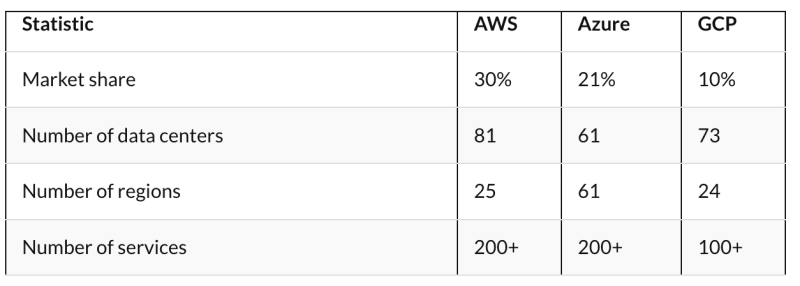Introduction
Choosing the right cloud provider is a critical decision for businesses of all sizes. Amazon Web Services (AWS), Microsoft Azure, and Google Cloud Platform (GCP) are the three leading cloud providers, each offering a wide range of services and features.
To help you choose the best cloud provider for your needs, we’ve compiled this comprehensive guide. We’ll compare AWS, Azure, and GCP in detail, highlighting their key strengths and weaknesses, pricing, and use cases. We’ll also provide some statistics to help you make an informed decision.
Key Features and Strengths
AWS
- Market share: AWS is the market leader in cloud computing, with a market share of over 30%.
- Service breadth: AWS offers the broadest range of cloud services, including computing, storage, networking, databases, analytics, machine learning, and more.
- Maturity: AWS is the most mature cloud platform, with a long track record of reliability and innovation.
Azure
- Integration with Microsoft products: Azure is tightly integrated with Microsoft products and services, such as Office 365 and Dynamics 365. This makes it a good choice for businesses that are already using Microsoft products.
- Hybrid cloud support: Azure offers excellent support for hybrid cloud deployments, allowing businesses to seamlessly connect their on-premises infrastructure with Azure cloud services.
- Security and compliance: Azure is committed to security and compliance, offering a wide range of features and services to help businesses protect their data and applications.
GCP
- Innovation: GCP is known for its innovation, offering a number of cutting-edge cloud services, such as artificial intelligence and machine learning.
- Performance: GCP is known for its high-performance network and infrastructure.
- Open source support: GCP is a strong supporter of open source software, offering a number of open source services and tools.
Pricing
All three cloud providers offer a pay-as-you-go pricing model, allowing businesses to scale their spending up or down based on their needs. However, there are some important pricing differences to consider.
AWS is generally considered to be the most expensive cloud provider, but it also offers the broadest range of services and features. Azure and GCP are generally more affordable than AWS, but they may not offer as many services or features.
Use Cases
AWS, Azure, and GCP are all suitable for a wide range of use cases. However, each platform has some strengths that make it a better fit for certain workloads.
AWS is a good choice for businesses with diverse workloads and scalability needs. It is also a good choice for businesses that need to use a wide range of cloud services.
Azure is a good choice for businesses that are heavily invested in the Microsoft ecosystem. It is also a good choice for businesses that need strong hybrid cloud support.
GCP is a good choice for businesses with data-driven workloads. It is also a good choice for businesses that need to use cutting-edge cloud services, such as artificial intelligence and machine learning.
Statistics
Here are some statistics to help you compare AWS, Azure, and GCP:
The numbers will change over time.
Here are some specific examples of how different businesses are using AWS, Azure, and GCP:
Netflix: Netflix uses AWS to power its global streaming service.
Airbnb: Airbnb uses AWS to manage its global vacation rental platform.
Amazon: Amazon uses AWS to power its e-commerce platform.
Microsoft: Microsoft uses Azure to power its Office 365 and Dynamics 365 cloud-based productivity and CRM applications.
Walmart: Walmart uses Azure to power its e-commerce platform and its in-store systems.
Spotify: Spotify uses GCP to power its global music streaming service.
Snapchat: Snapchat uses GCP to power its photo and video sharing app.
Lyft: Lyft uses GCP to power its ride-hailing platform.
Checkout more here




Top comments (0)